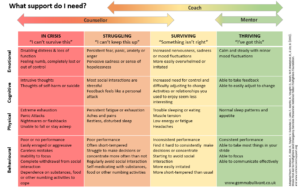With the constantly connected, complicated and on-the-go world we live in today, it can be easy to become overwhelmed and neglect our mental state and goals simply in order to survive. Avoid burying your head in the sand – it’s important to seek personal and professional help to learn lifelong coping mechanisms that can help not only with your own mind but can also help you to achieve career goals you never thought possible and get your life back on track.
A question often posed when it comes to mental health and wellbeing is – should I get a mentor, a coach or a counsellor?
Mentoring
Mentors typically give advice based on their own personal and professional experiences to guide an individual in their role at work. Mentoring is often a relationship between the individual and someone more experienced in the company. Companies will often assign mentors to new employees to show them the ropes and have someone to go to outside of their manager to ask questions or guidance from as they move into their new role. Depending on the skills of the mentor, there can be some overlap between the disciplines of mentoring and coaching.
A mentor might have undertaken some training, and any externally engaged professional mentor should have undertaken some form of training. However, in many organisations the role is often undertaken by a senior colleague without formal training, who instead has significant sector or functional experience to be able to provide guidance and support needed.
Mentoring is:
- Mostly directive – providing advice and guidance based on own experience
- Sometimes non-directive – giving the individual space to find their own answers
- Usually proactive/preventative in nature
- Generally career/role focused for long term progress
Benefits of mentoring
Mentoring is a great way for individuals and professionals to feel supported and heard by their fellow peers. Often organisational success is measured by fiscal performance and career development, and these are two areas that mentoring can help with. When a productive relationship is formed between a mentor and mentee, it is shown that the mentee generally feels more nurtured and supported in their role, and more empowered to take the right steps to achieve their professional goals. This can then encourage the mentee to become a future mentor themselves after seeing the benefits of it first-hand, creating a collaborative and supportive network in the workplace.
Other mentoring benefits include:
- Improved motivation at work
- Supported environment
- Boosted productivity
- Accelerated skills and career development
- Empowered employees
- Relationship building improvements
Coaching
Coaches are trained to operate within a broad spectrum of individual need, from psychological challenges to workplace effectiveness. Coaching is a form of self-development which can encompass both personal and professional goals through strategies unique to the individual. A coach is specialised in being able to help people to gain a better understanding of how our thoughts and feelings might affect our behaviours and perspective on the world.
Unlike a counsellor, a coach doesn’t necessarily seek to challenge or deepen our understanding of why we hold the beliefs we do, but rather learn ways to leverage these beliefs to our advantage. and might help facilitate the strengthening of work performance, life performance or a personal goal. A coach must be able to recognise and understand the needs of the individual to provide bespoke coaching approaches to help the individual to achieve their maximum potential at home or at work
A professional coach should always be trained and accredited through a professional coaching body (such as ICF, Association for Coaching or EMCC), follow a prescribed set of ethical guidelines.
Coaching is:
- Mostly non-directive – giving space and asking the right questions for the individual to find their own answers
- Sometimes directive – providing challenge or accountability as needed
- Can be personal or professional
- Can be proactive/preventative, or reactive/remedial in nature, depending on the situation
- Specific and measurable personal or professional goals, over a short or long-term timeframe, depending on individual need
Benefits of coaching
The benefits of coaching include greater self-awareness, positive mental health and wellbeing, increased self-confidence, and more effective communication skills, all of which support greater employee engagement, stronger relationships and improved work performance.
Professional coaching provides individuals with a constructive, confidential space to explore different approaches to the challenges they are facing. It enables individuals to create practical solutions and be held accountable to taking the steps needed to make positive changes to achieve their goals.
Coaching often works to address potential obstacles or challenges before they have happened, and can be a great way to avoid personal or professional issues spiralling into issues that could take longer to fix with in-depth counselling or therapy.
One of the main reasons that coaching can overlap with counselling at times is that coaching professionals will not simply work on a topic and explore that and only that. Coaches are trained to work with a person to ultimately help them to achieve the goals they want to achieve, which includes their own personal and mental challenges that may have been creating obstacles in to achieving those goals. Many professional coaches are trained to deal with moderate forms of mental incapacity, providing they are not extreme or debilitating in nature.
Therefore, working closely with a trained coach will not only help to achieve your goals and objectives in a strategic way, but it will help to uncover the reasons you may not have been able to achieve those goals in the past, all through customised sessions designed for you and your needs.
- Gives individuals a strong sense of self-awareness
- Self-discovery is explored in-depth
- Specific measures to track and review progress
- Gives the individual accountability
Counselling
Counsellors are highly trained to deal with psychological issues and problems an individual has, and they can help with a myriad of mental health challenges from depression to anxiety, to work-related stress. A counsellor is specialised in being able to help people to gain a better understanding of deep-rooted beliefs which can underpin our thoughts and feelings, and help to uncover ways to address these effectively. Counsellors may give you techniques to deal with the problem, however, they will not tell you what to do about certain issues and there is no set timeline to deal with the challenges that may be encountered.
A professional counsellor should always be trained and accredited through a professional counselling body (such as BACP or UKCP), and follow that body’s prescribed set of ethical guidelines.
Counselling is:
- Mostly non-directive – giving space and asking the right questions for the individual to find their own answers
- Sometimes directive – providing advice and guidance based on professional training
- Over short or long-term timeframe, depending on the issue
- Generally reactive/remedial in nature, triggered by a presenting issue, though the support provided can provide excellent preventative support for the future
- Generally focused on personal emotions and mental health
Benefits of counselling
Counselling will often take place where the individual has reached a point where they are in crisis or they are struggling to cope with their day-to-day life. Counselling will explore the very depths of the problem to uncover why it has happened in the first place, and help the individual determine how to resolve or manage the condition going forward.
As counselling is generally triggered by a presenting issue or crisis, it doesn’t typically start as a preventative measure, though topics covered in counselling can be applied by individuals to help prevent the reoccurrence of issues in the future.
Trained counsellors are equipped to deal with most forms of mental incapacity and distress, including extreme and debilitating conditions, including the effects of trauma and diagnosed psychological conditions, with scientific models to underpin their chosen therapeutic approaches.
Other counselling benefits include:
- Improved self-acceptance and self-esteem
- Changing self-defeating behaviour long-term
- Relief from pressing mental health challenges
- Coping mechanisms for destructive behaviours and feelings
Key differences between mentoring, coaching and counselling

Taking the example of grief, sometimes a partnership approach between coach and counsellor can work very well, where the individual works with both a coach and a counsellor in tandem, to provide holistic support. In this scenario, a counsellor might work directly with the grief event, and the coach might work with the emotional impact of the grief in relation to the individual’s workplace, such as tangible ways to manage the transition back to work after bereavement leave, with a personalised back to work plan.
In many scenarios, individuals may wish to switch between coaching, mentoring and counselling depending on their development needs. For instance, seeing a mentor may be a first step in getting your career on track, but then coaching may be a good idea for consistent career support and development techniques dealt with by a trained coach to guide you through the issues you may be having.
Which approach is right for me?
Ultimately, it’s down to the individual to decide on the right self-development path for them, and it may be a case of seeing all three for many people. The services discussed do not have to be used in isolation, and a combination of the three may actually be the best approach in preventing, guiding and fixing challenges that have revealed themselves over a lifetime.
In practise, there is no definitive line that determines which approach is more appropriate, and all three disciplines overlap.
Coaching works with behaviours and will affect everything from behaviour, values and beliefs to physical and emotional wellbeing, and these cannot be isolated from the individual. Although coaching works to satisfy a personal or professional goal with specific and measurable goals, coaching also has to work at the core of an individual to uncover why exactly they may be encountering personal or professional challenges.
Coaching works alongside both mentoring and counselling to develop an elevated self-awareness that is able to deal with the concerns or problems one may experience with strategies already in place to do so.




